Dalam hari ini bayarsaja.blogspot.com akan menyampaikan berita tentang North Korean reforms benefit the Kim family. Semoga dengan berita North Korean reforms benefit the Kim family akan menambah pengetahuan untuk anda pembaca setia bayarsaja.blogspot.com
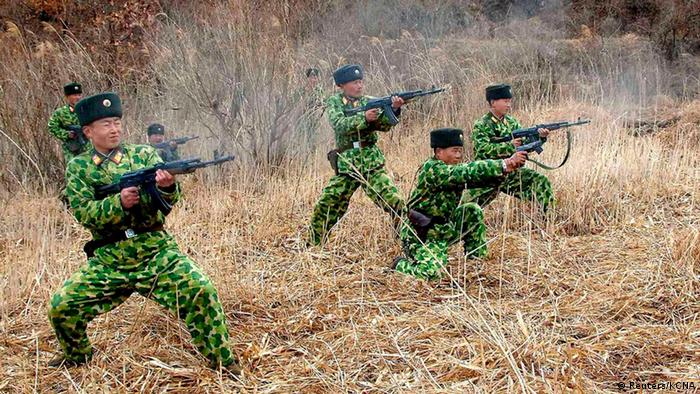
North Korean leader Kim Jong Un has promised reforms of the country's command economy. But the move is less about prosperity for all and more about solidifying the Kim dynasty.
Two-thirds of North Korea's 24 million inhabitants live hand-to-mouth, according to UN figures, and several million depend on relief from the international community. At the same time, tens of thousands recently celebrated the country's nuclear and missile tests in the capital Pyongyang, while the government threatened the United States with a nuclear attack.
The discrepancy between North Korea's utter economic failure and surly superpower blustering is a clear indication of how necessary and urgent economic reforms are in the poorest country in Asia. Even young Kim Jong Un is feeling the pressure to deliver.
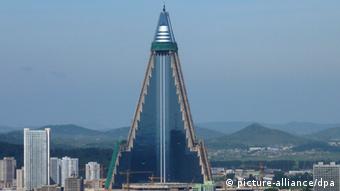 The 105-storey Ryugyong Hotel was a ruin for yearsTo mark Korean New Year, Kim promised his people that the country would rise to become an economic "superpower." The showcase project to demonstrate this transition is the refurbishment of the Ryugyong Hotel in Pyongyang. For two decades the unfinished 330-meter tall eyesore blighted the skyline of the capital.
The 105-storey Ryugyong Hotel was a ruin for yearsTo mark Korean New Year, Kim promised his people that the country would rise to become an economic "superpower." The showcase project to demonstrate this transition is the refurbishment of the Ryugyong Hotel in Pyongyang. For two decades the unfinished 330-meter tall eyesore blighted the skyline of the capital.
Now, the weather-beaten concrete carcass and empty window sashes have been replaced with a glistening glass façade, paid for by the Egyptian Orascom company in return for receiving the mobile phone monopoly for North Korea and its 1.8 million users.
Cash for cohorts
The magazine "The Economist" sees the corrupting influence of money at work as one of the consequences of this economic opening and push toward capitalism in North Korea.
But the reality is more complicated. Every channeled restructuring of the North's economy is first and foremost, designed to enhance the legitimacy and power of Kim Jong Un.
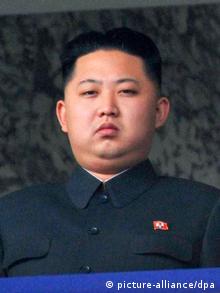 Kim Jong Un is the third generation of the Kim dynastyOnly recently, many more North Koreans have been allowed to work legally in China, which looks at first glance like a move toward more freedom of movement, but in reality the wages they earn in foreign currency are transferred directly to the regime in Pyongyang. At the same time, Kim has tightened controls at the border so that in 2012 only half as many people as usual were able to flee to China. The planned agricultural reforms also have nothing to do with turning away from Socialism.
Kim Jong Un is the third generation of the Kim dynastyOnly recently, many more North Koreans have been allowed to work legally in China, which looks at first glance like a move toward more freedom of movement, but in reality the wages they earn in foreign currency are transferred directly to the regime in Pyongyang. At the same time, Kim has tightened controls at the border so that in 2012 only half as many people as usual were able to flee to China. The planned agricultural reforms also have nothing to do with turning away from Socialism.
A decree issued on June 28 last year ordered farm collectives to be broken up into smaller groups with farmers allowed to keep 30 percent of their harvest. The first tests of this new policy are underway in three of the country's seven provinces. But the amount farmers are allowed to keep only applies to surplus produce.
Furthermore, farmers have been ordered to return to their collective plots of land they were given just 10 years ago. In other words, the farm reforms are not designed to increase production and reduce food shortages, but rather to reduce the gap between state-subsidized and market prices and cut the country's runaway inflation rate of 116 percent.
Legal uncertainty hinders investment
For the promised expansion of light industry, North Korea urgently needs foreign investment. Theoretically, investors are interested in the lucrative deposits of rare earths and other metals, well-trained workers, low wages of a dollar a day and the proximity to major markets, such as China, Japan and South Korea.
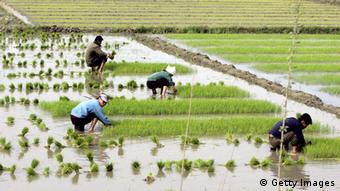 Attempts to reform the economy have not been successfulA generous new law with a modern framework is supposed to attract potential financiers. Chinese have already founded joint ventures. More goods are flowing into the country, thanks to South Korean business partners and shelves in shops are fuller and more private vehicles can be seen on North Korea's roads.
Attempts to reform the economy have not been successfulA generous new law with a modern framework is supposed to attract potential financiers. Chinese have already founded joint ventures. More goods are flowing into the country, thanks to South Korean business partners and shelves in shops are fuller and more private vehicles can be seen on North Korea's roads.
But a real investment boom is not likely due to the lack of legal protection. Once the money starts flowing, North Korea pushes investors out, such as the Chinese Xiyang Group, which has described its North Korean iron ore mine venture as a "nightmare."
So far, only Egypt's Orascom has escaped a similar fate, perhaps because Pyongyang would be unable to operate the network itself. In addition, foreign firms operating in North Korea face international penalties for violating UN sanctions.
Low rate of return
Another argument against direct foreign investment is the small market of 24 million consumers with almost no purchasing power. Add to this ancillary costs for hefty bribes and run-down or non-existent infrastructure and foreign interest begins to wane. What's more, investors have no control over whether forced labor is used in their joint ventures. Business ventures are also complicated by the fact that North Korea keeps all its figures secret and publishes virtually no statistics, not even its gross domestic product.
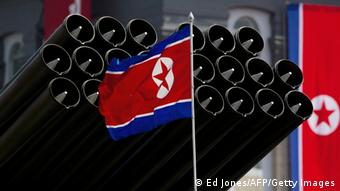 North Korea's military absorbs most of the country's resources"Due to its isolation, there is hardly any country with as little knowledge of economic basics as North Korea," notes Bernhard Seliger, bureau chief of the German Hanns-Seidel Foundation in Seoul, South Korea.
North Korea's military absorbs most of the country's resources"Due to its isolation, there is hardly any country with as little knowledge of economic basics as North Korea," notes Bernhard Seliger, bureau chief of the German Hanns-Seidel Foundation in Seoul, South Korea.
There is good reason to be skeptical since the leadership in Pyongyang over the last six decades has mostly concerned itself with hanging onto power. Every economic reform must improve and safeguard the conditions for regime loyalists in the administration, military and leadership class.
The survival of the Kim dynasty is based on mistrust and the compulsion to control everything. The proximity to prospering South Korea - and the danger of an uncontrolled reunification - forces the regime to be particularly cautious. A new commercial class that had sprung up, for example, was expropriated through a currency reform in 2009.
No self-criticism
Unlike his father and grandfather, Kim Jong Un has admitted that the economic goals have not been reached. But there is no self-criticism; instead, other forces are always at fault. The United States and its hostile blockade policies, or the "lack responsibility among workers, who are not exerting themselves" are the problem, as Kim pronounced during a speech earlier this month.
The real cause behind North Korea's misery is the regime's official "Songun," or "military first," policy, which directs nearly all of the country's resources to the armed forces. But without the bayonet, Kim would have no power base.
The discrepancy between North Korea's utter economic failure and surly superpower blustering is a clear indication of how necessary and urgent economic reforms are in the poorest country in Asia. Even young Kim Jong Un is feeling the pressure to deliver.
 The 105-storey Ryugyong Hotel was a ruin for years
The 105-storey Ryugyong Hotel was a ruin for yearsNow, the weather-beaten concrete carcass and empty window sashes have been replaced with a glistening glass façade, paid for by the Egyptian Orascom company in return for receiving the mobile phone monopoly for North Korea and its 1.8 million users.
Cash for cohorts
The magazine "The Economist" sees the corrupting influence of money at work as one of the consequences of this economic opening and push toward capitalism in North Korea.
But the reality is more complicated. Every channeled restructuring of the North's economy is first and foremost, designed to enhance the legitimacy and power of Kim Jong Un.
 Kim Jong Un is the third generation of the Kim dynasty
Kim Jong Un is the third generation of the Kim dynastyA decree issued on June 28 last year ordered farm collectives to be broken up into smaller groups with farmers allowed to keep 30 percent of their harvest. The first tests of this new policy are underway in three of the country's seven provinces. But the amount farmers are allowed to keep only applies to surplus produce.
Furthermore, farmers have been ordered to return to their collective plots of land they were given just 10 years ago. In other words, the farm reforms are not designed to increase production and reduce food shortages, but rather to reduce the gap between state-subsidized and market prices and cut the country's runaway inflation rate of 116 percent.
Legal uncertainty hinders investment
For the promised expansion of light industry, North Korea urgently needs foreign investment. Theoretically, investors are interested in the lucrative deposits of rare earths and other metals, well-trained workers, low wages of a dollar a day and the proximity to major markets, such as China, Japan and South Korea.
 Attempts to reform the economy have not been successful
Attempts to reform the economy have not been successfulBut a real investment boom is not likely due to the lack of legal protection. Once the money starts flowing, North Korea pushes investors out, such as the Chinese Xiyang Group, which has described its North Korean iron ore mine venture as a "nightmare."
So far, only Egypt's Orascom has escaped a similar fate, perhaps because Pyongyang would be unable to operate the network itself. In addition, foreign firms operating in North Korea face international penalties for violating UN sanctions.
Low rate of return
Another argument against direct foreign investment is the small market of 24 million consumers with almost no purchasing power. Add to this ancillary costs for hefty bribes and run-down or non-existent infrastructure and foreign interest begins to wane. What's more, investors have no control over whether forced labor is used in their joint ventures. Business ventures are also complicated by the fact that North Korea keeps all its figures secret and publishes virtually no statistics, not even its gross domestic product.
 North Korea's military absorbs most of the country's resources
North Korea's military absorbs most of the country's resourcesThere is good reason to be skeptical since the leadership in Pyongyang over the last six decades has mostly concerned itself with hanging onto power. Every economic reform must improve and safeguard the conditions for regime loyalists in the administration, military and leadership class.
The survival of the Kim dynasty is based on mistrust and the compulsion to control everything. The proximity to prospering South Korea - and the danger of an uncontrolled reunification - forces the regime to be particularly cautious. A new commercial class that had sprung up, for example, was expropriated through a currency reform in 2009.
No self-criticism
Unlike his father and grandfather, Kim Jong Un has admitted that the economic goals have not been reached. But there is no self-criticism; instead, other forces are always at fault. The United States and its hostile blockade policies, or the "lack responsibility among workers, who are not exerting themselves" are the problem, as Kim pronounced during a speech earlier this month.
The real cause behind North Korea's misery is the regime's official "Songun," or "military first," policy, which directs nearly all of the country's resources to the armed forces. But without the bayonet, Kim would have no power base.
Dapatkan berita terupdate dan unik setiap saat hanya di bayarsaja.blogspot.com
Homepage|http://bayarsaja.blogspot.com









0 komentar:
Posting Komentar
Mohon berkomentar dengan baik dan sopan. Komentar bernada spam akan saya hapus